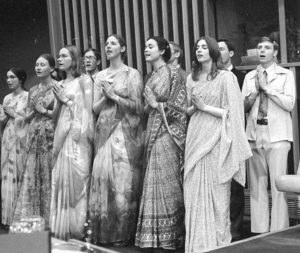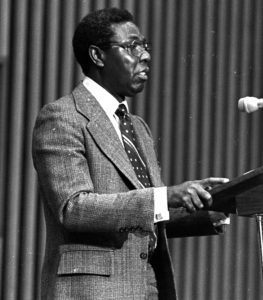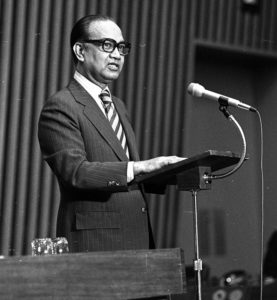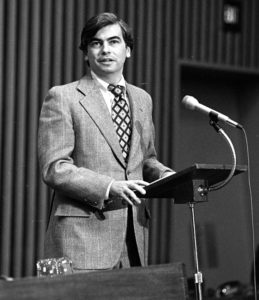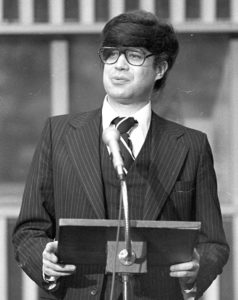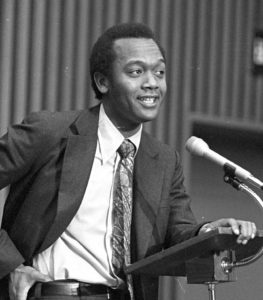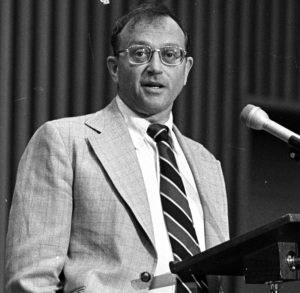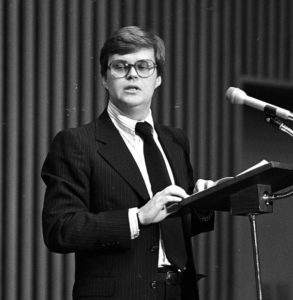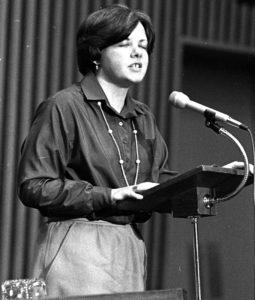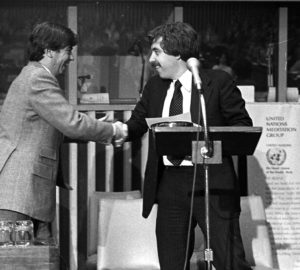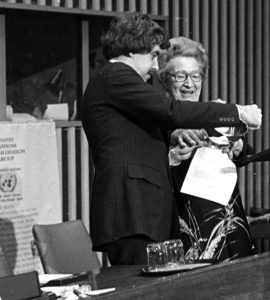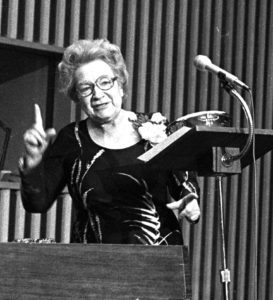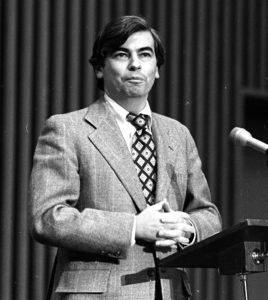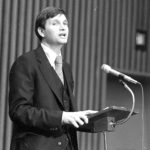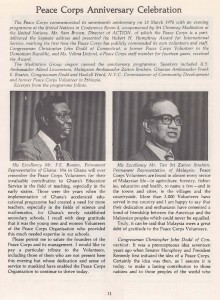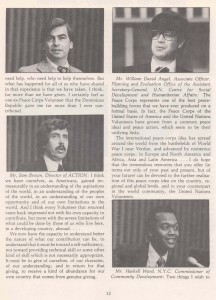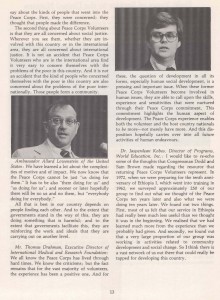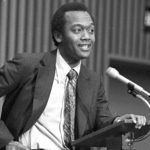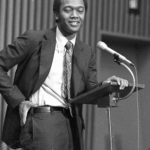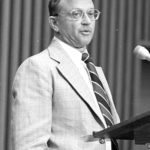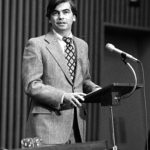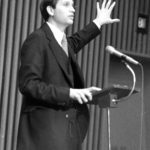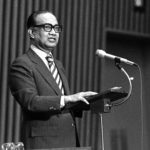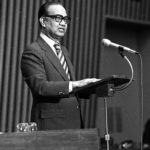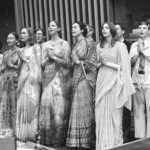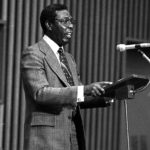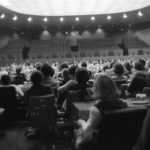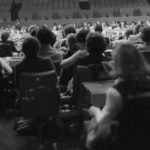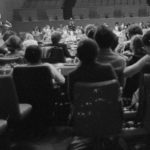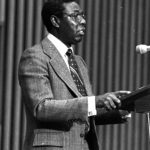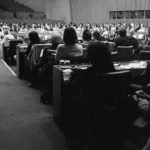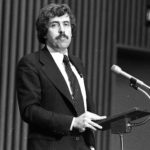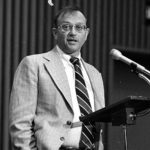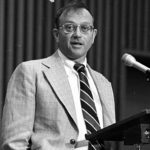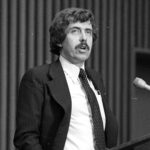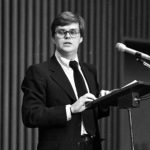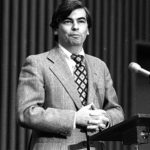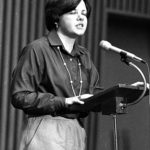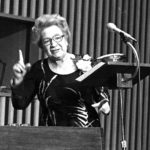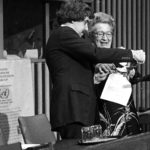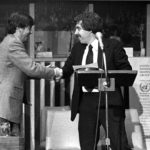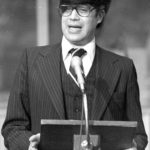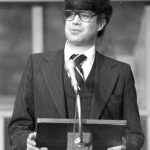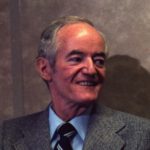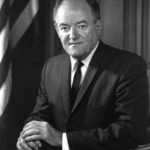Peace Corps Anniversary Celebration – common peace ideal with UN Volunteers 1978 Mar SUMMARY
Filed under 2 or more | Tributes and Expressions of appreciationThe Peace Corps commemorated its seventeenth anniversary on 15 March 1978 with an evening programme at the United Nations in Conference Room 4, co-sponsored by Sri Chinmoy Meditation at the United Nations.
HIGHLIGHTED Quote from programme::
“the Peace Corps of the USA and the UN Volunteers have grown from a common peace ideal and peace action“
* * * * * * * * * * * * * * * * * * * * *
Mr. Sam Brown, Director of ACTION, of which the Peace Corps is a part, delivered the key note address and presented the Hubert H. Humphrey Award for International Service, marking the first time the Peace Corps has publicly commended its own volunteers and staff. Congressman Christopher John Dodd of Connecticut, a former Peace Corps Volunteer in the Dominican Republic, and Ms. Velma Linford, a Peace Corps staff member for fourteen years, received the Award.
* * * * * * * * * * * * * * * * * * * * *
The Meditation Group singers opened the anniversary programme. Speakers included U.S. Ambassador Allard Lowenstein, Malaysian A mbassador Zaiton Ibrahim, Ghanian Ambassador Frank E. Boaten, Congressman Dodd and Haskell Ward, N.Y.C. Commissioner of Community Development and former Peace Corps Volunteer in Ethiopia.
Excerpts from the programme follow.
* * * * * * * * * * * * * * * * * * * * *
Below is summary: for more details of event see: peace-corps-anniversary-common-peace-ideal-with-un-volunteers-1978-mar-details/
Introduction:
Ambassadors and honoured guests, friends, we would like to welcome you to our programme tonight in honour of the seventeenth anniversary of the Peace Corps. Peace: a significant part of the name of this Organisation and a concept dear to us in this United Nations Building. There was inspiration and aspiration present when John Kennedy, Hubert Humphrey and others established this Organisation. At that time, through this inspiration and aspiration, they touched the hearts of many of their fellow countrymen and women and called forth a response – a desire to serve selflessly the cause of peace. It was this same desire for peace which helped begin the United Nations thirty-two years ago.
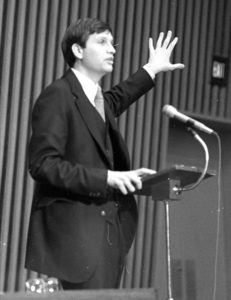 Some of you may know of a small room here, the Meditation Room of the United Nations. It was this same need for peace, and some hard work by our second Secretary-General, Dag Hammarskjold, and others that founded and redesigned this room. There is an inscription on a plaque outside that room that I feel is appropriate to quote, saying that this room is devoted to peace and those that are giving their lives for peace. It is in this spirit that we would like to dedicate this programme to those who are giving their lives for peace all over the world through national and international organisations, as well as to all those who are working for peace through education, business , politics and in other ways.
Some of you may know of a small room here, the Meditation Room of the United Nations. It was this same need for peace, and some hard work by our second Secretary-General, Dag Hammarskjold, and others that founded and redesigned this room. There is an inscription on a plaque outside that room that I feel is appropriate to quote, saying that this room is devoted to peace and those that are giving their lives for peace. It is in this spirit that we would like to dedicate this programme to those who are giving their lives for peace all over the world through national and international organisations, as well as to all those who are working for peace through education, business , politics and in other ways.
Again, we are grateful that all of you could be with us here tonight. The Meditation Group would like to begin the programme with three songs that are dedicated to the spirit of peace. Thank you. – A.K. Keefe – for the Meditation Group.
His Excellency Mr. F.E. Beaten, Permanent Representative of Ghana: We in Ghana will ever remember the Peace Corps Volunteers for their invaluable contribution to Ghana’s Education Service in the field of teaching, especially in the early sixt ies. Those were the years when the implementation of Ghana’s accelerated educational programme had created a need for more teachers, especially in the fields of science and mathematics, for Ghana’s newly established secondary schools. I recall with deep gratitude that it was the young men and women Volunteers of the Peace Corps Organisation who provided this much needed expertise in our schools.
Please permit me to salute the founders of the Peace Corps and its management. I would like to pay a particular tribute to the Volunteers, including those of them who are not present here this evening but whose dedication and sense of service to mankind have enabled the Peace Corps Organisation to continue to thrive today.
* * * * * * * * * * * * * * * * * * * * *
His Excellency Mr. Tan Sri Zaiton Ibrahim, Permanent Representative of Malaysia:
Peace Corps Volunteers are found in almost every sector of Malaysian life- in agriculture, forestry, fisheries, education and health, to name a few-and in the towns and cities, in the villages and the countryside .
More than 3,000 Volunteers have served in my country and I am happy to say that their dedication and enthusiasm have cemented a bond of friendship between the American and the Malaysian peoples which could never be equalled.
Truly, it can be said that Malaysia owes a great debt of gratitude to the Peace Corps Volunteers.
* * * * * * * * * * * * * * * * * * * * *
Congressman Christopher John Dodd of Connecticut:
It was a presumptuous idea seventeen years ago when Senator Humphrey and President Kennedy first initiated the idea of a Peace Corps.
Certainly the idea was then, as I assume it is today, to make a lasting contribution to those nations and to those peoples of the world who need help, who need help to help themselves.
But what has happened for all of us who have shared in that experience is that we have taken, I think, far more than we have given.
I certainly feel as one ex-Peace Corps Volunteer that the Dominican Republic gave me far more than I ever contributed.
* * * * * * * * * * * * * * * * * * * * *
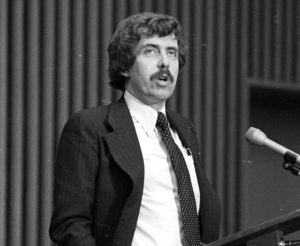 Mr. Sam Brown, Director of ACTION:
Mr. Sam Brown, Director of ACTION:
I think we have ourselves, as Americans, gained immeasurably in an understanding of the aspirations of the world, in an understanding of the peoples of the world, in an understanding of our own opportunity and of our own limitations in the world.
And I think every Volunteer that returned came back impressed not with his own capacity to contribute, but more with the severe limitations of what could be done by those of us who live here, in a developing country, abroad….
We now have the capacity to understand better the nature of what our contribution can be, to understand that it must be toward a self-sufficiency, not toward providing technical skill or some other kind of skill which is not necessarily appropriate.
It must be to give of ourselves, of our character, of our understanding; and in return for that giving, to receive a kind of abundance for our own country that comes from genuine giving.
* * * * * * * * * * * * * * * * * * * * *
Mr. William David Angel, Associate Officer, Planning and Evaluation Office of the Assistant Secretary-General, U.N. Centre for Social Development and Humanitarian Affairs:
The Peace Corps represents one of the best peace building forces that we have ever produced on a formal basis.
In fact, the Peace Corps of the United States of America and the United Nations Volunteers have grown from a common peace ideal and peace action, which seem to be their unifying links.
The international peace corps idea has spread around the world from the battlefields of World War I near Verdun, and advanced by numerous peace corps: in Europe and North America and Africa, Asia and Latin America….
I do hope that the tremendous resources that you offer (in terms not only of your past and present, but of your future) can be devoted to the further realisation of this peace corps idea on the country, regional and global levels, and to your counterpart in the world community, the United Nations Volunteers.
* * * * * * * * * * * * * * * * * * * * *
Mr. Haskell Ward, N.Y. C. Commissioner of Community Development:
Two things I wish tos ay about the kinds of people that went into the Peace Corps.
First, they were concerned; they thought that people made the difference.
The second thing about Peace Corps Volunteers is that they are all concerned about social justice.
Wherever you see them, whether they are involved with this country or in the international area, they are all concerned about international justice.
It is not an accident that Peace Corps Volunteers who are in the international area find it very easy to concern themselves with the problems of the poor in this country.
And it is not an accident that the kind of people who concerned themselves with the poor in this country are also concerned about the problems of the poor internationally.
Those people form a community.
* * * * * * * * * * * * * * * * * * * * *
Ambassador Allard Lowenstein of the United States:
We have learned a lot about the complexities of motive and of impact.
We now know that the Peace Corps cannot be just “us doing for them.” It has to be also “them doing for us” and “us doing for us” ; and sooner or later hopefully there will be no us and no them, but “everybody doing for everybody.”
All that is best in our country depends on people finding each other.
And to the extent that governments stand in the way of this, they are doing something that is harmful; and to the extent that governments facilitate this, they are reinforcing the work and ideals that they are carrying out on another level.
* * * * * * * * * * * * * * * * * * * * *
Mr. Thomas Drahman, Executive Director of International Medical and Research Foundation:
We all know the Peace Corps has lived through hard times.
We know the criticisms; but the fact remains that for the vast majority of volunteers, the experience has been a positive one. And for these, the question of development in all its forms, especially human social development, is a pressing and important issue.
When these former Peace Corps Volunteers become involved in human issues, they are able to call upon the skills, experience and sensitivities that were nurtured through their Peace Corps commitment.
This commitment highlights the human aspect of development.
The Peace Corps experience enables both the volunteer and the host country nationals to be more-not merely have more.
And this disposition hopefully carries over into all future activities of human endeavours.
* * * * * * * * * * * * * * * * * * * * *
Dr. Jasperdean Kobes, Director of Programs, World Education, Inc.:
I would like to re-echo some of the thoughts that Congressman Dodd and Sam Brown made regarding the resource that returning Peace Corps Volunteers represent.
In 1972, when we were preparing for the tenth anniversary of Ethiopia I, which went into training in 1962, we surveyed approximately 250 of our group to find out what we thought of the Peace Corps ten years later and also what we were doing ten years later. We found out two things.
First, most of us felt that our service in Ethiopia had really been much.less useful than we thought it was in the beginning. We realised that we had learned much more from the experience than we probably had given. And secondly, we found out that a very large proportion of our group was working in activities related to community development and social change. So I think there is a vast network of us out there that could really be tapped for developing this country.
* * * * * * * * * * * * * * * * * * * * *
Presentation of Hubert H. Humphrey Award for International Service
for full recipient remarks see DETAILS in page images at peace-corps-anniversary-common-peace-ideal-with-un-volunteers-1978-mar-details/
Closing after presentation
of the “Hubert H. Humphrey Award for International Service.”:
Three years ago we had a programme here at the United Nations, which Senator Humphrey was not able to attend.
But he would have liked to and he sent us a message.
I think it’s appropriate to close our programme with that message (from Senator Humphrey) now:
“I join my friends at the United Nations, and throughout the United States, in 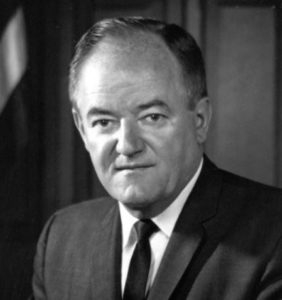 the hope and prayer that a just and lasting peace may be achieved within and among the nations of the world.
the hope and prayer that a just and lasting peace may be achieved within and among the nations of the world.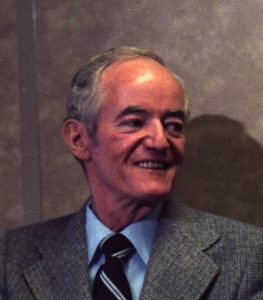
On this special occasion I urge them to join me in reaffirming a strong personal commitment to the relentless pursuit of this peace.”
– Hubert Horatio Humphrey Jr. (May 27, 1911 – January 13, 1978) served as the 38th Vice President of the United States; in the United States Senate, from 1949-64 and 1971-78; and nominee in the 1968 presidential election,
* * * * * * * * * * * * * * * * * * * * *
Page Images:
- (c) Copyrights Sri Chinmoy Centre
- (c) Copyrights Sri Chinmoy Centre
- (c) Copyrights Sri Chinmoy Centre
- (c) Copyrights Sri Chinmoy Centre
- (c) Copyrights Sri Chinmoy Centre
- (c) Copyrights Sri Chinmoy Centre
- (c) Copyrights Sri Chinmoy Centre
- (c) Copyrights Sri Chinmoy Centre
- (c) Copyrights Sri Chinmoy Centre
- (c) Copyrights Sri Chinmoy Centre
- (c) Copyrights Sri Chinmoy Centre
- (c) Copyrights Sri Chinmoy Centre
- (c) Copyrights Sri Chinmoy Centre
- (c) Copyrights Sri Chinmoy Centre
- 1978-03-15-05-audience-conf-room-4-floor-entrance.jpg
- (c) Copyrights Sri Chinmoy Centre
- (c) Copyrights Sri Chinmoy Centre
- 1978-03-15-07-amb-allard-k-Lowenstein-usa-crp-02
- (c) Copyrights Sri Chinmoy Centre
- (c) Copyrights Sri Chinmoy Centre
- (c) Copyrights Sri Chinmoy Centre
- 1978-03-15-09dr-josperdean-kobes-world-education
- 1978-03-15-10-Velma-Limford-dir-recruitment-action-usa
- (c) Copyrights Sri Chinmoy Centre
- (c) Copyrights Sri Chinmoy Centre
- (c) Copyrights Sri Chinmoy Centre
- 1978-03-15-02-william-angel-Asoc-officer-plan-evaluation-UN
- (c) Copyrights Sri Chinmoy Centre
